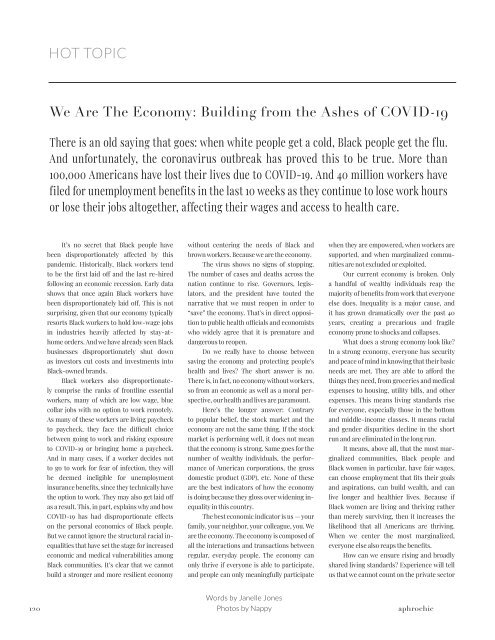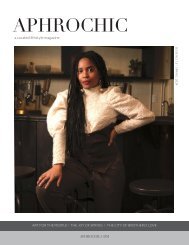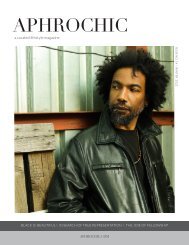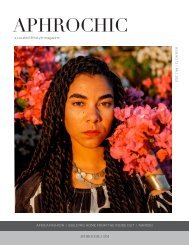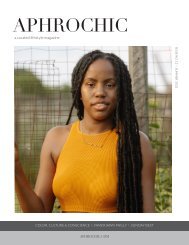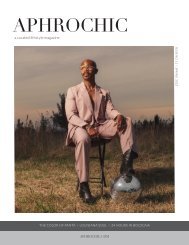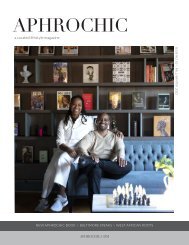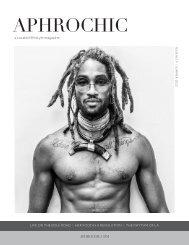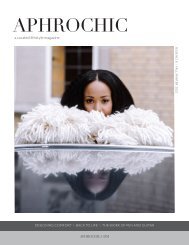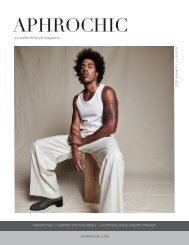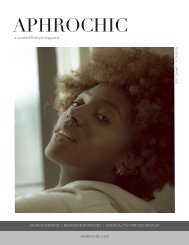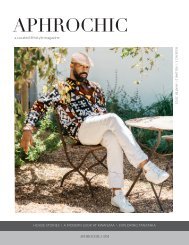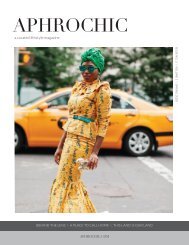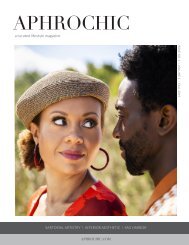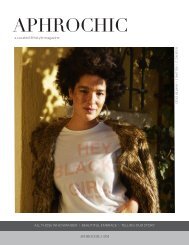AphroChic Magazine: Issue No. 4
In this issue, we sit down with artist, Malik Roberts, who relates the experience of creating one of the few African American artworks to sit permanently in the Vatican collection. Fashion designer, Prajjé Oscar John-Baptiste introduces his latest collection — an ode to Haiti, and its goddesses. We head to South Carolina to experience the Gullah-inspired music of Ranky Tanky. And in New York, we watch a new world being born with photographer and journalist, Naeem Douglass, who takes us inside the city’s Black Lives Matter protests, and economist Janelle Jones, who reminds us in these times that we are the economy. We are thrilled to share our cover with chef and musician, Lazarus Lynch. Inside, we talk with him about his cookbook, Son of a Southern Chef and his new album, I’m Gay. From a house tour in Brooklyn to a travel piece in Tobago, this issue takes you all over the Diaspora. And we see how of the concept of Diaspora was first introduced in a look back at how Pan-Africanism led the way to how we think of international Blackness today. It is a showcase of our culture, our creativity, our resilience, and our diversity, our demands for the present and our hopes for the future. Welcome to our summer issue.
In this issue, we sit down with artist, Malik Roberts, who relates the experience of creating one of the few African American artworks to sit permanently in the Vatican collection. Fashion designer, Prajjé Oscar John-Baptiste introduces his latest collection — an ode to Haiti, and its goddesses. We head to South Carolina to experience the Gullah-inspired music of Ranky Tanky. And in New York, we watch a new world being born with photographer and journalist, Naeem Douglass, who takes us inside the city’s Black Lives Matter protests, and economist Janelle Jones, who reminds us in these times that we are the economy.
We are thrilled to share our cover with chef and musician, Lazarus Lynch. Inside, we talk with him about his cookbook, Son of a Southern Chef and his new album, I’m Gay.
From a house tour in Brooklyn to a travel piece in Tobago, this issue takes you all over the Diaspora. And we see how of the concept of Diaspora was first introduced in a look back at how Pan-Africanism led the way to how we think of international Blackness today. It is a showcase of our culture, our creativity, our resilience, and our diversity, our demands for the present and our hopes for the future. Welcome to our summer issue.
Create successful ePaper yourself
Turn your PDF publications into a flip-book with our unique Google optimized e-Paper software.
HOT TOPIC<br />
We Are The Economy: Building from the Ashes of COVID-19<br />
There is an old saying that goes: when white people get a cold, Black people get the flu.<br />
And unfortunately, the coronavirus outbreak has proved this to be true. More than<br />
100,000 Americans have lost their lives due to COVID-19. And 40 million workers have<br />
filed for unemployment benefits in the last 10 weeks as they continue to lose work hours<br />
or lose their jobs altogether, affecting their wages and access to health care.<br />
It’s no secret that Black people have<br />
without centering the needs of Black and<br />
when they are empowered, when workers are<br />
been disproportionately affected by this<br />
brown workers. Because we are the economy.<br />
supported, and when marginalized commu-<br />
pandemic. Historically, Black workers tend<br />
The virus shows no signs of stopping.<br />
nities are not excluded or exploited.<br />
to be the first laid off and the last re-hired<br />
The number of cases and deaths across the<br />
Our current economy is broken. Only<br />
following an economic recession. Early data<br />
nation continue to rise. Governors, legis-<br />
a handful of wealthy individuals reap the<br />
shows that once again Black workers have<br />
lators, and the president have touted the<br />
majority of benefits from work that everyone<br />
been disproportionately laid off. This is not<br />
narrative that we must reopen in order to<br />
else does. Inequality is a major cause, and<br />
surprising, given that our economy typically<br />
“save” the economy. That's in direct opposi-<br />
it has grown dramatically over the past 40<br />
resorts Black workers to hold low-wage jobs<br />
tion to public health officials and economists<br />
years, creating a precarious and fragile<br />
in industries heavily affected by stay-at-<br />
who widely agree that it is premature and<br />
economy prone to shocks and collapses.<br />
to secure the common economic good for the<br />
their benefit.<br />
ly for marginalized and under-resourced<br />
home orders. And we have already seen Black<br />
dangerous to reopen.<br />
What does a strong economy look like?<br />
majority of Americans. Workers are central.<br />
To counter the harmful narrative of<br />
communities, and businesses compete<br />
businesses disproportionately shut down<br />
Do we really have to choose between<br />
In a strong economy, everyone has security<br />
Investing in workers, providing protections<br />
trickle-down economics, we must instead<br />
healthily without the presence of large mo-<br />
as investors cut costs and investments into<br />
saving the economy and protecting people’s<br />
and peace of mind in knowing that their basic<br />
from exploitation and harm, preventing the<br />
center the needs of everyday people to<br />
nopolies. With all of these systems in place,<br />
Black-owned brands.<br />
health and lives? The short answer is no.<br />
needs are met. They are able to afford the<br />
exclusion of marginalized workers — elimi-<br />
ensure a stronger and more resilient<br />
living standards will rise and provide more<br />
Black workers also disproportionate-<br />
There is, in fact, no economy without workers,<br />
things they need, from groceries and medical<br />
nating margins altogether — and empower-<br />
economy that works for everyone. To<br />
economic security, dignity, and freedom<br />
ly comprise the ranks of frontline essential<br />
so from an economic as well as a moral per-<br />
expenses to housing, utility bills, and other<br />
ing workers to demand more rights through<br />
begin raising living standards and increas-<br />
for people to live happy, healthy, and secure<br />
workers, many of which are low wage, blue<br />
spective, our health and lives are paramount.<br />
expenses. This means living standards rise<br />
collective bargaining are some of the ways<br />
ing well-being for everyday people, we can<br />
lives.<br />
collar jobs with no option to work remotely.<br />
Here’s the longer answer: Contrary<br />
for everyone, especially those in the bottom<br />
we can advocate for workers and worker<br />
provide public investments in workers,<br />
So what does this worldview mean in<br />
As many of these workers are living paycheck<br />
to popular belief, the stock market and the<br />
and middle-income classes. It means racial<br />
productivity. When entire communities are<br />
families, and communities, such as public<br />
our current moment, especially for Black<br />
to paycheck, they face the difficult choice<br />
economy are not the same thing. If the stock<br />
and gender disparities decline in the short<br />
exploited, disempowered, and underval-<br />
schools, public health, and public housing. A<br />
folks? Well, we have to remember that the<br />
between going to work and risking exposure<br />
market is performing well, it does not mean<br />
run and are eliminated in the long run.<br />
ued, it creates a fragile economy composed of<br />
prosperous society invests in everyone, re-<br />
coronavirus outbreak was the straw that<br />
to COVID-19 or bringing home a paycheck.<br />
that the economy is strong. Same goes for the<br />
It means, above all, that the most mar-<br />
exhausted workers.<br />
gardless of race, gender, class, geography, or<br />
broke the camel’s back. Our economy was<br />
And in many cases, if a worker decides not<br />
number of wealthy individuals, the perfor-<br />
ginalized communities, Black people and<br />
Currently, our economy is producing<br />
any other identity. Broadly shared prosperity<br />
not prepared for an economic depression<br />
to go to work for fear of infection, they will<br />
mance of American corporations, the gross<br />
Black women in particular, have fair wages,<br />
more, but fewer people are benefiting. The<br />
creates widespread stability so that everyone<br />
and global pandemic. Our social safety net<br />
be deemed ineligible for unemployment<br />
domestic product (GDP), etc. <strong>No</strong>ne of these<br />
can choose employment that fits their goals<br />
key to ensuring economic benefits don’t all<br />
can actively participate in buying and selling<br />
has been decimated and public infrastruc-<br />
insurance benefits, since they technically have<br />
are the best indicators of how the economy<br />
and aspirations, can build wealth, and can<br />
trickle up to the top 1% is an equitable dis-<br />
goods, which will prompt the private sector<br />
ture remains underfunded. Black people<br />
the option to work. They may also get laid off<br />
is doing because they gloss over widening in-<br />
live longer and healthier lives. Because if<br />
tribution of power. When power becomes<br />
to invest in people and physical capital to<br />
were struggling before this crisis, but we<br />
as a result. This, in part, explains why and how<br />
equality in this country.<br />
Black women are living and thriving rather<br />
concentrated in the hands of the few, they<br />
meet the rising demand.<br />
don’t have to struggle in our recovery. We<br />
COVID-19 has had disproportionate effects<br />
The best economic indicator is us — your<br />
than merely surviving, then it increases the<br />
will use that power to hoard their economic<br />
If anti-racist, power re-distribut-<br />
must push for immediate relief now that<br />
on the personal economics of Black people.<br />
family, your neighbor, your colleague, you. We<br />
likelihood that all Americans are thriving.<br />
riches. This is exactly why “trickle down”<br />
ing structures are set in place, then we can<br />
also reorients our economic system to be<br />
But we cannot ignore the structural racial in-<br />
are the economy. The economy is composed of<br />
When we center the most marginalized,<br />
economics fail to deliver economic prosper-<br />
ensure the economic gains are broadly<br />
stronger and allows Black people to have the<br />
equalities that have set the stage for increased<br />
all the interactions and transactions between<br />
everyone else also reaps the benefits.<br />
ity: it ignores the role of power. And without<br />
and equitably shared. This means workers<br />
full, secure and prosperous economic lives<br />
economic and medical vulnerabilities among<br />
regular, everyday people. The economy can<br />
How can we ensure rising and broadly<br />
rules and regulations, the rich will shape<br />
are able to bargain collectively with their<br />
that we deserve.<br />
Black communities. It’s clear that we cannot<br />
only thrive if everyone is able to participate,<br />
shared living standards? Experience will tell<br />
markets, bend rules, and implement systems<br />
employers, public services and invest-<br />
Janelle Jones is the Managing Director for Policy and Research<br />
build a stronger and more resilient economy<br />
and people can only meaningfully participate<br />
us that we cannot count on the private sector<br />
of exploitation — like structural racism — to<br />
ments are widely available but especial-<br />
at Groundwork Collaborative (groundworkcollaborative.org).<br />
Words by Janelle Jones<br />
120 Photos by Nappy<br />
aphrochic issue four 121


